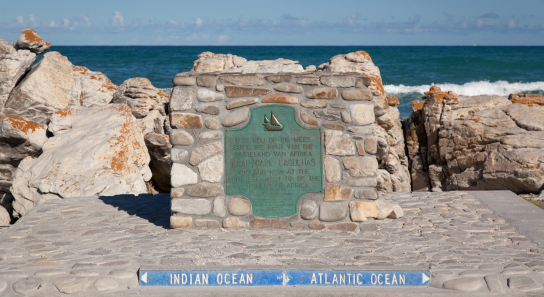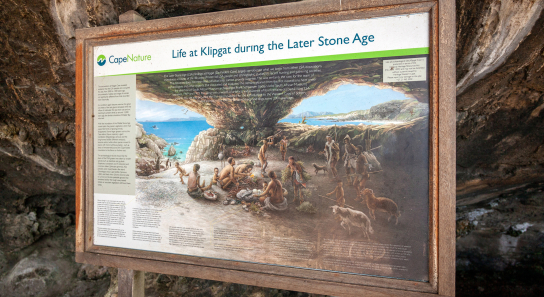Take a step towards the wonders of nature!
Make Enquiry
Need help crafting a unique itinerary for your stay? Or, do you simply have a question we haven’t answered? Get in touch with us and we’ll get back to you right away.
The Coastline that Shaped Humanity
In the last 30 years, Human Origin Science has reached a consensus: All Modern Humans on Earth descended from a small population in Africa. Specifically, a population that lived along the Cape Western coast. Travel back in time with us to learn more about this fascinating history.
AN EVOLUTIONARY BREAKTHROUGH
“It is believed this lifestyle change ultimately led to man’s ability to process complex cognitive and behavioural advancements.”
Archaeological findings proved that a group of advanced early humans once called this region home. During the Ice Age, when large parts of the globe were covered in inhospitable sheets of ice, this area was an exception.
It was a comfortable climate with abundant food sources that enabled typically nomadic people to find shelter and settle permanently. It is believed this lifestyle change ultimately led to man’s ability to process complex cognitive and behavioural advancements, distinguishing them as the first known Modern Humans.
Learn the Secrets of the Past
Archaeological evidence shows that a significant milestone in human evolution occurred along the coastline between Walker Bay and Stilbaai. This remarkable body of research shows how the region’s rich and stable natural environment shaped human survival and progress. Watch this video to uncover the story about this key moment in time.
LESSONS FROM HISTORY
The stone tools, carvings, plant pigmentation, and food remnants found on these sites helped scientists piece together a picture of the past. One that proves the direct connection between man and the land.
Protecting the Past
The archaeological findings provided scientists with invaluable insight into how early humans recognised the importance of interacting with their environment for survival, which ultimately led to cultural and cognitive advancements. Given the magnitude of these findings, these sites are now protected as historical landmarks in South Africa.
The Grootbos Connection
As leaders in conservation, we have long believed that humans and nature are interconnected. By highlighting the importance of protecting this vulnerable relationship, we can better safeguard the future. The archaeological discoveries have cemented our resolve even more.
Our Place in the World
There is an ongoing conversation about human origin, evolution and climate. The findings made at our doorstep have put Grootbos, the Cape Agulhas Region, and South Africa firmly on the map. The world is paying close attention to how these learnings of early human life can inform sustainable responses to the environmental challenges we face.
Explore a Rich Heritage
Time Travel with our Guides
- Explore the coastline and uncover the secrets of how ancient people lived.
- Take a guided walk or drive through the fynbos and learn more about the heritage-rich landscape.
- Explore the most southern tip of Africa.
The story of Modern Humans may have begun 170 000 years ago, but it is still very much alive today. Our guides will share this fascinating history with you as you explore an ancient coastal cave – once home to early inhabitants who helped shape the course of humanity. You can also take a guided walk through the fynbos landscape that sustained early explorers, and uncover the ancient secrets hidden in the land.
Man's Connection with Nature
Klipgat Cave was first identified for its archaeological importance to the world in 1968. Subsequent excavations uncovered the earliest evidence of complex behaviour and provided a critical piece of the human evolution puzzle.
Coastline
Walker Bay is a rich source of sea life. Studies of the shell middens, at Klipgat Cave reveal that early humans foraged for mussels and molluscs. The act of sourcing food from the sea shows adaptive innovation and cooperation – key traits of human evolution.
Land
Grootbos is home to the same carbohydrate-rich geophyte plant species as consumed by early humans. Their ability to distinguish toxic from edible varieties reflects significant cognitive advancement. It also illustrates man’s ability to live in deep connection with nature.
Fire
Early humans mastered fire management, using it to flush out wildlife from dense vegetation, making it easier to hunt, as well as, cook food. Fire also stimulates new plant regrowth, which provided nutritional food sources.
Culture
The findings at Klipgat evidenced a cooperative community. One who learned to grind pigments from plants, engrave symbols and craft stone tools using other stones. This marks advanced levels of cognition and ultimately the source of Modern Humans.
Continue on Your Journey of Discovery
Uncover the Bigger PictureThe discoveries made on the Cape coastline are just one stepping stone on the path of human evolution. They help us trace the footsteps of our earliest ancestors and how they adapted, evolved and ultimately explored the planet. Discover the greater picure that helped us understand this inspiring, often humbling and fascinating journey.


Grootbos Foundation and global recognition
Grootbos is a world leader in sustainable tourism and has been awarded some of the highest international accolades possible, making us one of only a handful of lodges to achieve this.











